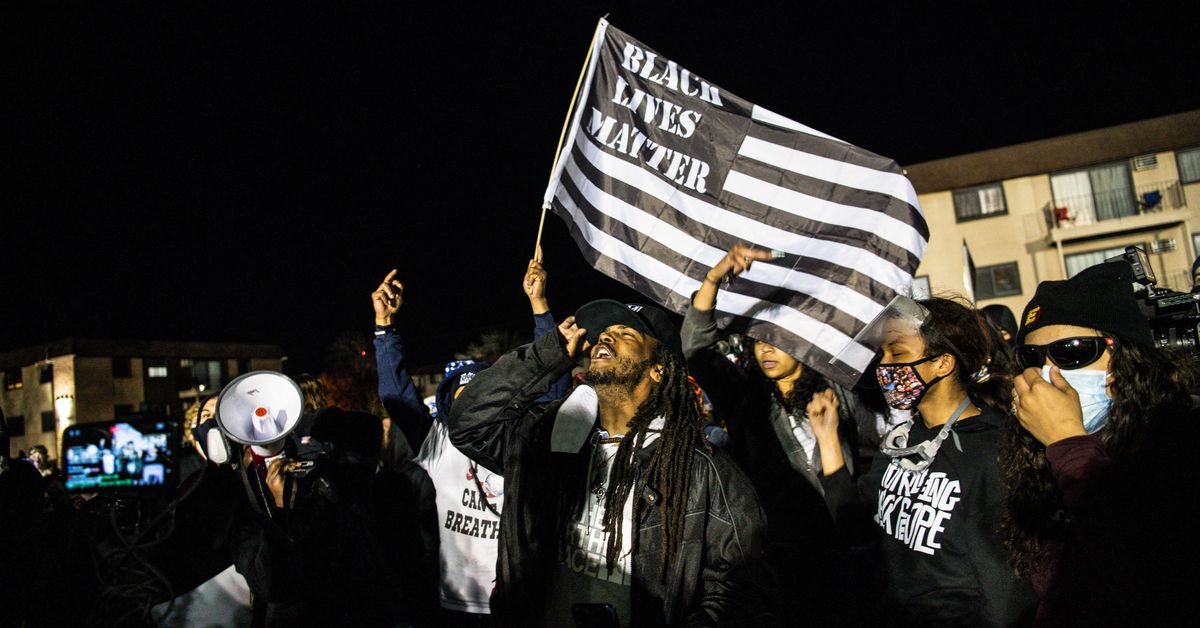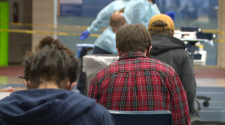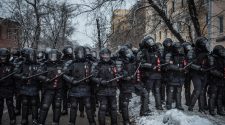Days before a jury convicted Derek Chauvin of murdering George Floyd, a group of boys on bicycles were stopped by police officers in the town of Perth Amboy, New Jersey.
Footage uploaded by one of the boys shows the predominantly Black and Latino group riding close to cars and popping wheelies, but nothing seems illegal. Multiple squad cars appear; the kids, who say they’re far from home and afraid of losing their bikes, try to get away before being pulled over.
One officer tries to defuse the situation, promising the kids he won’t take their bikes if they stay on the right side of the road; the kids even applaud him as he walks away. But then a second officer, a sergeant, starts grabbing at one of the kid’s bikes. She yells at a Black boy for challenging her, arrests him, and seizes all of the kids’ bikes. The first officer, the one who seemed nice at first, backs his colleague.
The legal justification for the bike seizure is an obscure city ordinance, enacted in 1939, requiring that cyclists obtain a license to operate a bike and display a tag on their vehicle. The absurdity of the pretext helps illustrate the grim reality behind this interaction: For millions of Americans, this is what the government looks like. In many communities, especially poor Black ones, police harassment, arrest, and incarceration are routine parts of life — shaping how they understand the nature of the American state itself.
This has a dangerous — and not widely appreciated — effect on our democracy.
A swath of political science research shows that contact with the criminal justice system, through a serious encounter that ends in incarceration or merely low-level harassment like a bike seizure, can make people more distrustful of the government in general. This, in turn, makes them less likely to vote and participate in civic life — believing the state can’t be made to serve people like them.
Derek Chauvin’s conviction shows that, sometimes, police can be held accountable for their worst excesses. But these rare victories belie the structural damage done by our current policing system, a constant grinding pressure on Black communities that serves as a quiet disenfranchisement machine.
Policing versus democracy
The number of Americans with firsthand exposure to the criminal justice system is staggering.
Between 70 and 100 million Americans have some kind of criminal record — meaning they’ve been convicted of a crime, incarcerated, or have a pending criminal case. This number, high as it is, significantly understates American police exposure: many arrests do not result in convictions; the vast majority of traffic and street stops do not lead to arrests. Obviously, these interactions are distributed unevenly: A wealthy white person is far less likely to be imprisoned or stopped on the street than a poor Black one.
In their 2014 book Arresting Citizenship, political scientists Amy Lerman and Vesla Weaver examine the consequences of this “unprecedented” carceral state for American democracy. They argue that hostile interactions with cops and prosecutors serve as a kind of negative civic instruction — alienating millions of Americans from the institutions that, in theory, are supposed to serve them.
“Instead of developing the tools and ethos of engaged citizens, they learn to stay quiet, make no demands, and be wary and distrustful of political authorities,” Lerman and Weaver write.
To explore this effect in more depth, Lerman and Weaver analyzed several large datasets and conducted roughly 100 in-person interviews in six cities. What they found was startling: America has a separate socio-political reality, which they call the “custodial lifeworld,” for individuals and communities with high exposure to the criminal justice system. For these citizens, coercion is the only government they really know, and it shapes their view of the political system far more than elections or tax policy ever could.
“Democracy don’t get you a second chance,” Renard, one of the interviewees, told Lerman and Weaver. “Once you mess up, you given your life over to the government, because they got you.”
The skepticism about the state on display in Renard’s comments — a “deep and sometimes totalizing sense of political alienation,” as Lerman and Weaver put it — shapes the way people touched by the system act. The police have taught them, through oft-brutal lessons, that “they are not voluntary participant in democratic politics, but involuntary subject to intervention from the state.”
The result, Lerman and Weaver write, is a withdrawal from political life altogether: “those with criminal justice contact are less likely to participate in civic groups or express their political voice in elections.” These effects vary based on level of exposure to the criminal justice system; while citizens who have been arrested but not convicted are seven percent less likely to vote, individuals who have spent over a year in prison are nearly a third less likely to vote (when eligible).
As with all social science research, Lerman and Weaver’s book isn’t perfect. But subsequent research has found some real support for their findings.
One study of New York’s stop and frisk program found that Black and Latino voters in neighborhoods with lots of stops were less likely to turn out when eligible. A second study found that Black people convicted of misdemeanors were considerably less likely to turn out after conviction. A third found that women with incarcerated partners were less likely to vote, suggesting that overpolicing socializes both punished individuals and their broader communities into political alienation.
In a 2020 Science paper with sociologist Gwen Prowse, Weaver pushes the argument even further — arguing that modern America is defined by a kind of “racial authoritarianism” primarily enforced through the criminal justice system.
“Drawing on the largest database of narrative accounts of policing in US cities after the Baltimore uprising of 2015, we see that U.S. residents have a sophisticated understanding of the actual operation of democracy and are witnesses to its relationship to authoritarian practices,” Prowse and Weaver argue. “Stopped by police, subject to violation of privacy and displays of force, routine seizure of resources, and unable to freely assemble because of police occupation of their neighborhoods, they described being effectively outside the provisions of the main text of US democracy — the Constitution.”
The democratic damage of overpolicing
It’s important to put this research in the context of America’s other democratic failings.
First, there’s the outdated design of the system itself. The Electoral College privileges voters in a handful of disproportionately white swing states. The structure of the Senate, where each state gets two votes regardless of population, dramatically overweights white rural voters relative to urban minorities. Even in the more egalitarian House, rural voters are overweighted because they’re more geographically spread out.
Then there’s the concerted Republican campaign to rig the system in their favor. Because the systemic flaws allow the GOP to remain competitive without appealing to a majority of Americans, the party has decided to double down on the system’s unfairness. Policies like extreme gerrymandering, voter suppression like Georgia’s SB 202, and felon disenfranchisement all serve to enhance the power of its rural white coalition at the expense of non-whites and city dwellers.
The criminal justice system’s demobilizing effects are different than either of these two features of our political system. They aren’t the result of an ancient constitution or contemporary partisan conflict, but the unintended consequences of a bipartisan approach to crime control that dominated American politics in the late 20th century.

But because heavily policed neighborhoods tend to be disproportionately Black and urban, criminal justice plays into the same basic problem: in ways big and small, the US political system is unrepresentative.
Certain kinds of people have influence over political outcomes wildly disproportionate to their numbers, in a way that just so happens to correlate with the racial hierarchy that’s defined this country since its outset. And this group’s fears about losing its power seem to be fueling a broad anti-democratic backlash, one that threatens the stability of the system itself.
But even if the American system weren’t in a crisis so huge, we should care about the criminal justice system’s damage to our faith in government.
In a democracy, we care that citizens feel like they are governing themselves: Arguably, that’s the point of the entire system. If our government is disempowering large numbers of Americans, turning them into subjects rather than citizens, we are doing something profoundly wrong — violating the core promise of a republic for the people.
During the New Jersey bike stop, one of the officers asks the kids why they didn’t stop when the police first tried to pull them over. “Because you guys take bikes,” the boy filming responds.
There’s a bone-deep distrust of the system embedded in that simple sentence. This child, a citizen of the wealthiest democracy in the world, is saying that he doesn’t trust agents of his government to treat him fairly. And the worst part is that he was right: The cops really did take their bike and even arrested one of his friends to boot.
The kids did eventually get their bikes back. The one who was arrested did not face charges.
But what lesson should these kids take from that? Certainly not that they can trust the police, or that the government cares about their well-being. What they learned is that their initial instinct — that the cops have it out for them — was right.
















